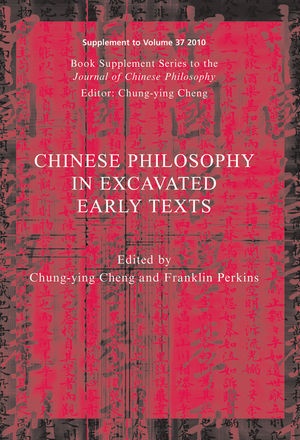Read more
Informationen zum Autor Chung-ying Cheng is a Taiwanese philosopher and professor of philosophy at the University of Hawai'i at Manoa. He received his BA in 1956 from National Taiwan University, his MA in 1958 from University of Washington, and PhD in 1964 from Harvard University.Professor Cheng's research interests are in the areas of Chinese logic, the I-Ching and the origins of Chinese philosophy, Confucian and Neo-Confucian Philosophy, the onto-hermeneutics of Eastern and Western philosophy, and Chan (Zen) philosophy. Recently he has specifically worked on the philosophy of c-management and Confucian Bio-Ethics as they relate to the Chinese tradition, and on how Chinese culture relates to world culture. Klappentext Since 1973 Mawangdui excavations of silk manuscripts on Yijing and Daodejing, 1993 excavations of Bamboo texts in early Confucianism, 1997 Shanghai Museum acquisitions of Bamboo Manuscripts of additional texts on early Confucianism, and 2008 Tsinghua University Acquisitions of Bamboo Manuscripts to do with the Book of Documents, Classical Confucian and Daoist texts are undergoing a process of exegesis, emendation, textual re-reading and re- interpretation with regard to philological and historical scholarship.These excavated texts from underground are no doubt tremendously significant and valuable, because they represent and indicate a genuine part of ancient intellectual history in China full of inquisitive intelligence and the insight of humanity. This should make us wonder how we are related to them and in what way they could deepen our knowledge about Confucianism and Daoism as both ways and contents of thinking. We can see how these texts can be read as human thoughts composed of analytical distinctions and empirical observations with well-considered evaluations in either explicit arguments or hidden ones. In this sense they address to us as philosophical dialogues and dialectical explorations, showing a process of inquiry and a way of thinking.No systematic philosophical reflections have been undertaken on these texts until the prevent volume, which is developed with the purpose of understanding how, what and why philosophical issues of virtue, self, people, destiny, political rule, nature of humanity, and creativity in classical Confucianism and Daosim are proposed, formed and even transformed; and how at the same time these ideas strive to enlighten us about their importance for history of Chinese philosophy, contemporary global ethics and philosophy of humanity and the dao. The nine papers of this Supplement on these significant issues and important ideas are closely accentuated and critically discussed by well-established specialists, philosophers and historians, from various relevant disciplines of study. Zusammenfassung The nine papers of this Supplement on these significant issues and important ideas are closely accentuated and critically discussed by well-established specialists! philosophers and historians! from various relevant disciplines of study. Inhaltsverzeichnis Introduction: Chinese Philosophy in Excavated Early Texts (CHUNG-YING CHENG).The Tsinghua: Bamboo Strips and Ancient Chinese Civilization (LI XUEQIN AND LIU GUOZHONG).Recontextualizing Xing: Self-Cultivation and Human Nature in the Guodian Texts (FRANKLIN PERKINS)The Guodian Bamboo Slips and Confucian Theories of Human Nature (CHEN LAI).Theodicies of Discontinuity: Domesticating Energies and Dispositions in Early China (MICHAEL PUETT)Abdication and Utopian Vision in the Bamboo Slip Manuscript, Rongchengshi (SARAH ALLAN).Returning to "Zisi": The Confucian Theory of the Lineage of the Way (LIANG TAO)."San De" and Warring States Views on Heavenly Retribution (SCOTT COOK).Divination and Autonomy: New Perspectives from Excavated Texts (LISA RAPHALS).On Internal Onto-Genesis of Virtuous Actions in the Wu Xing Pian (CHUNG-YING CHENG)....

